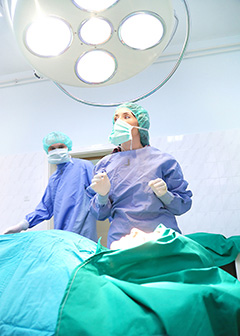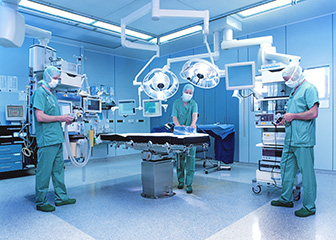How to Become a Surgical Technologist About this section

Surgical technologists work as members of a healthcare team alongside physicians and surgeons, registered nurses, and other healthcare workers.
Surgical technologists typically need a postsecondary certificate or associate’s degree. Certification also can help a surgical technologist find a position. A small number of states regulate surgical technologists.
Education
People interested in surgical technology should take high school courses in health, biology, chemistry, and mathematics.
Surgical technologists typically need some type of postsecondary education. Accredited programs in surgical technology are in many community colleges and vocational schools. Programs range in length from several months to two years, and they grant a certificate or associate’s degree. Admission typically requires a high school diploma or equivalent.
Surgical technology education includes courses in anatomy, biology, medical terminology, and other topics. Students also work in supervised clinical settings to gain hands-on skills as technologists. In addition, technologists are trained in the care and safety of patients, sterilization techniques, and preventing and controlling infections.
In 2010, accredited training programs were recognized by the Commission on Accreditation of Allied Health Education Programs (CAAHEP).
Important Qualities
Detail oriented. Surgical technologists must pay close attention to their work at all times. For example, they need to provide the correct sterile equipment for surgeons and nurses during an operation.
Dexterity. Surgical technologists should be comfortable working with their hands. They must be able to provide the needed equipment quickly.
Stamina. Surgical technologists should be comfortable standing for an extended period.
Stress-management skills. Working in an operating room can be stressful. Surgical technologists should be able to work well under pressure while providing a high level of care.
Certification
Certification can help a surgical technologist find a position. Surgical technologists earn certification through one of two credentialing organizations. Certification through the National Board of Surgical Technology and Surgical Assisting allows the use of the title “Certified Surgical Technologist.” Certification through the National Center for Competency Testing allows the use of the title “Tech in Surgery-Certified.” Certification typically requires completing an accredited formal education program, passing an exam, and undergoing continuing education.
The National Healthcare Association (NHA) also offers the Certified Operating Room and Surgical Technician (CORST) certification. Candidates can complete an accredited training program, or have one year of experience working in the field. After passing the exam, individuals may use the designation Certified Operating Room Surgical Technician (CORST). This certification must be renewed every two years through either continuing education or reexamination. Additional information can be found on the CORST information page.
A small number of states and the District of Columbia have regulations governing the work of surgical technologists. In these jurisdictions, surgical technologists must have graduated from an accredited education program and received certification.
Advancement
With experience and additional education, surgical technologists can advance to become surgical assistants. Surgical technologists also occasionally advance to other healthcare occupations, such as physician assistants or registered nurses. For more information, see the profiles on physician assistants and registered nurses.








